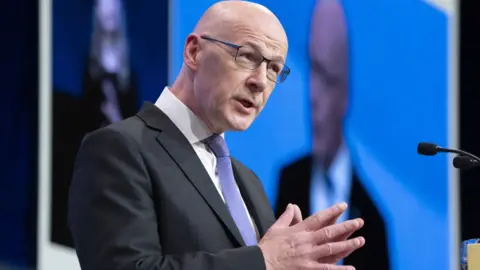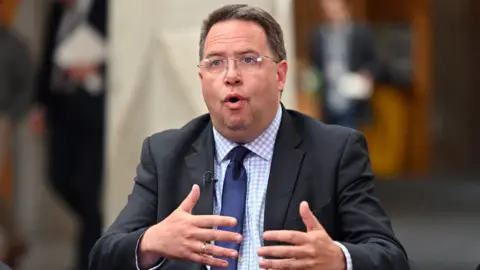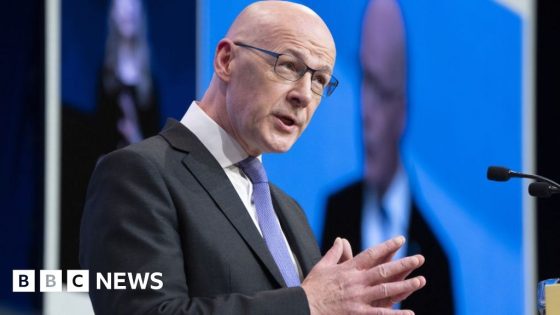 PA Media
PA MediaThe Scottish independence referendum left an “overwhelmingly positive legacy” on the country, First Minister John Swinney has claimed.
The SNP leader, speaking at an event in Edinburgh to mark the 10th anniversary of the 2014 vote, claimed Scotland was now closer to separating from the UK.
He also praised “gracious” leaders of the No campaign for their “understanding” in the aftermath of the result.
Opposition leaders have urged the SNP to move on from the “division” of the independence debate.
On 18 September 2014, Scots voted by 55.3% to 44.7% in favour of remaining in the UK.
Speaking to supporters in the capital a decade on, Swinney spoke of the excitement of the campaign turning to “heartbreak”.
He said praised leading figures in the No campaign for being “gracious” and “understanding” in victory.
“If the result had gone the other way I know I would have extended the same courtesy to me,” the first minister said.
He said members of the Yes movement “picked themselves up, dusted themselves down, and looked to the future with a renewed determination” after the defeat.
The SNP leader, who was finance secretary at the time of the referendum, added: “And that’s why, even though I was devastated by the result, I am in no doubt that Scotland’s independence referendum has left an overwhelmingly positive legacy on our country.”
The Scottish Parliament gained powers over income tax and welfare spending after the referendum.
But Swinney claimed promises of a “partnership of equals” were not kept, and said Holyrood had seen its power “weakened and undermined” by Westminster.
However, he insisted the country could not “live in the past”.
The first minister added: “As a nation, we can’t just regret the things that we cannot do – it is time for us to start focusing again on the things that we can.”
‘Never been more convinced’
Swinney said the country was now closer to achieving independence because the referendum led to Holyrood gaining more powers which have demonstrated its ability to have a “positive impact” on the lives of Scots.
He said he had “never been more convinced” of the case for independence, citing the “harsh reality of Westminster control”.
Successive UK governments have refused to countenance a second referendum, while the Supreme Court has ruled Holyrood ministers cannot hold a referendum without Westminster’s consent.
Asked for his plan to secure independence, Swinney said the SNP had to show it provided a solution to the major challenges Scotland faces – citing the NHS, schools, the cost of living and energy prices.
The first minister said independence had to be established as a “compelling and demonstrable” proposition.
“When we boost support for independence we will be able to deliver independence,” he added.
 Getty Images
Getty ImagesScottish Conservative chairman Craig Hoy said: “On the 10th anniversary of the independence referendum, it’s time for the SNP to end a decade of division and finally let Scotland heal.”
He added: “Scotland has been stuck in a state of paralysis for 10 years precisely because the SNP have refused to accept the result. They have failed to move on and focus on the day job.”
Scottish Labour leader Anas Sarwar said the people of Scotland had lived through a “decade of turbulence, division and decline in our politics” since the 2014 vote to stay in the UK.
Looking ahead to the Holyrood election in 2026, the Scottish Labour leader said the country could “begin the work of clearing up the mess left by the SNP” after the vote.
Scottish Greens co-leader Lorna Slater said: “The Scottish Greens will do everything we can to ensure that by the time the 20th anniversary of the day comes around, we are celebrating rather than thinking about what could have been, and are doing it in a fairer, greener and independent Scottish republic.”
Source Agencies



